


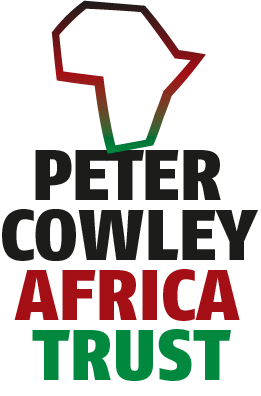
The two rural areas of Kenya in which PCAT provides grants are both semi-arid, and have suffered over recent years from erratic rainfall. Many families are still reliant on fetching water from water sources such as rivers which carry the risk of contamination from animals. Subsistence farmers rely on rainfall and very few have access to regular water supplies for irrigation.
The provision of boreholes to provide safe water supplies, and small scale dams and water tanks to enable water collection and storage are all ways of helping local communities respond to water shortages.
In the areas where PCAT’s partners work many local communities lack access to safe and reliable sources of drinking water. PCAT has funded the provision of a number of boreholes with handpumps, particularly in the Isiolo area. More recently PCAT has funded the drilling of a borehole for the school and community at Gacabari, a very isolated area of Mbeere district. The borehole is 30 metres deep. A pump and water storage tanks still need to be provided. Although the county government had promised funding for this no funding has yet been provided.
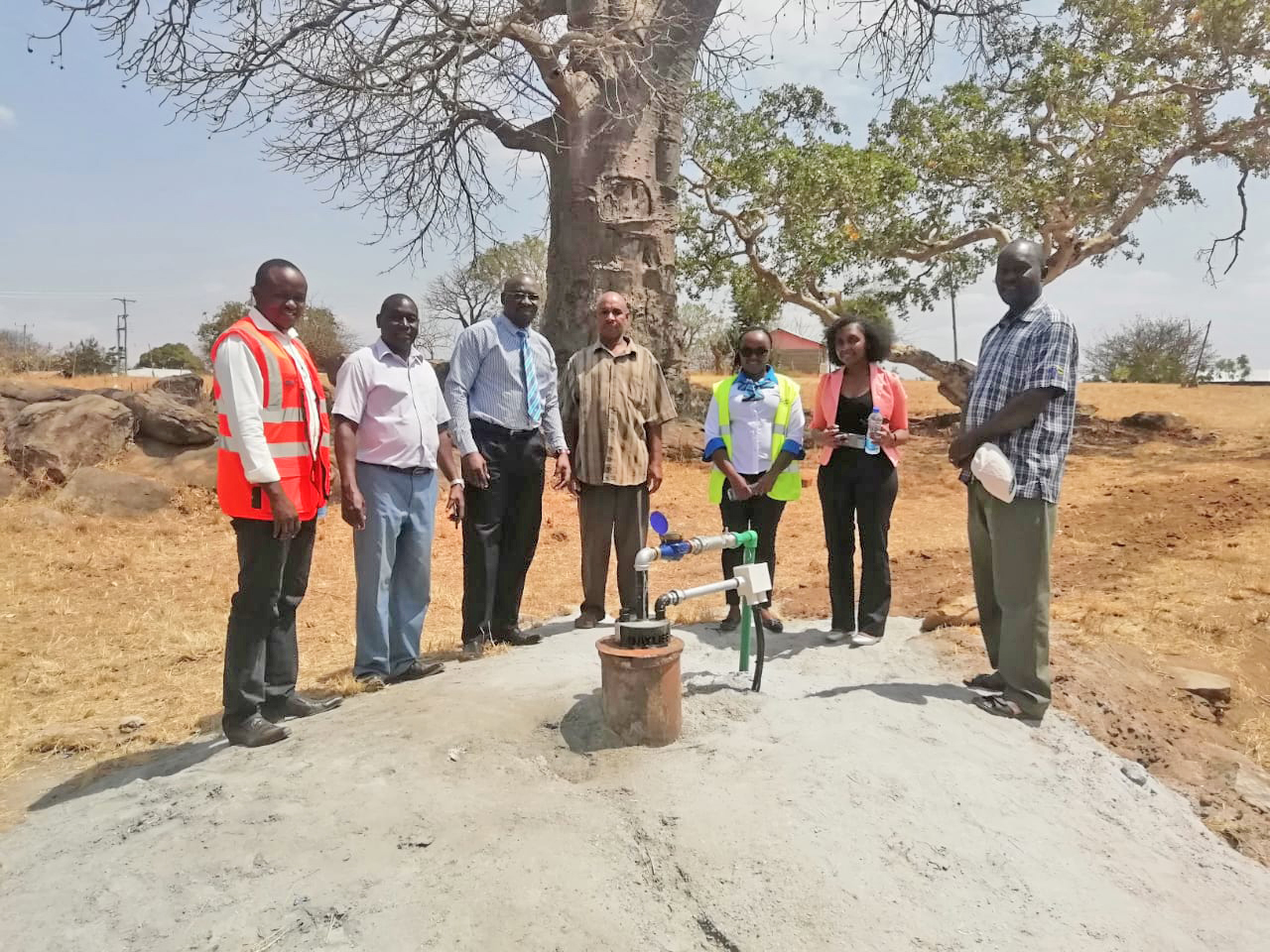
Gacabari borehole and pump at Isiolo.
PCAT has provided funding for two earth dams in Mwala district in Machakos county and three earth dams in Mbeere district in Embu county. The Mwala dam was constructed in 2011/12 and is in a gully to catch water run-off during the rainy seasons and provides a water supply to 40 families living in the immediate area. There is no local piped water supply and no nearby borehole.
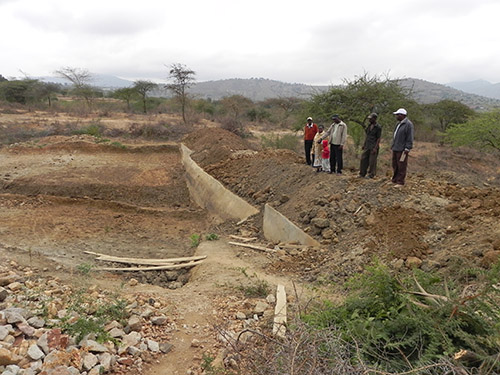
The dam at Mathima under construction in 2011.
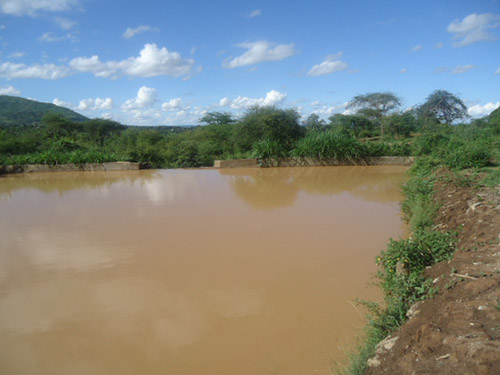
The completed dam at Mathima in October 2012.
In 2015 PCAT provided a grant for the construction of a second concrete and earth dam proposed by the Mango women’s group. The dam wall is about three metres high and the reservoir will be filled from water run off during the rainy season. The dam benefits 25 families in the locality where the nearest water supply is about 2.5km away.
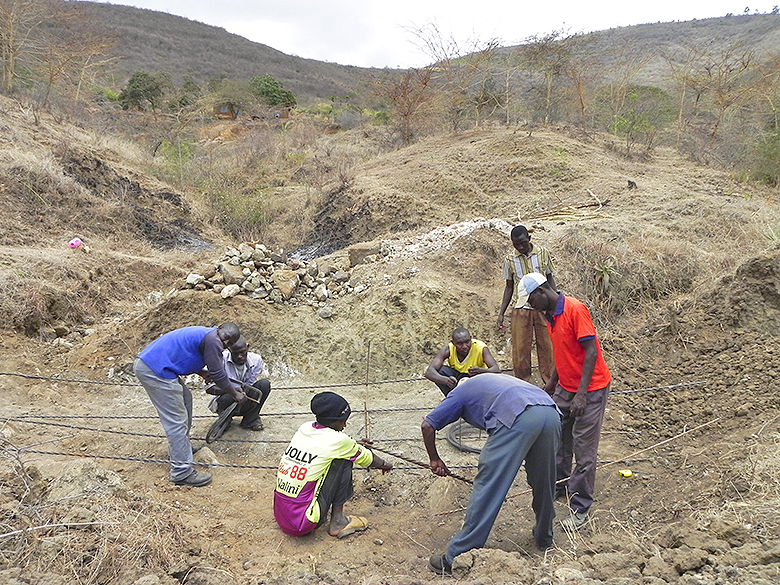
Construction work for the Mango dam – reinforcing rods for the concrete dam base. The dam catchment area is behind the workmen.
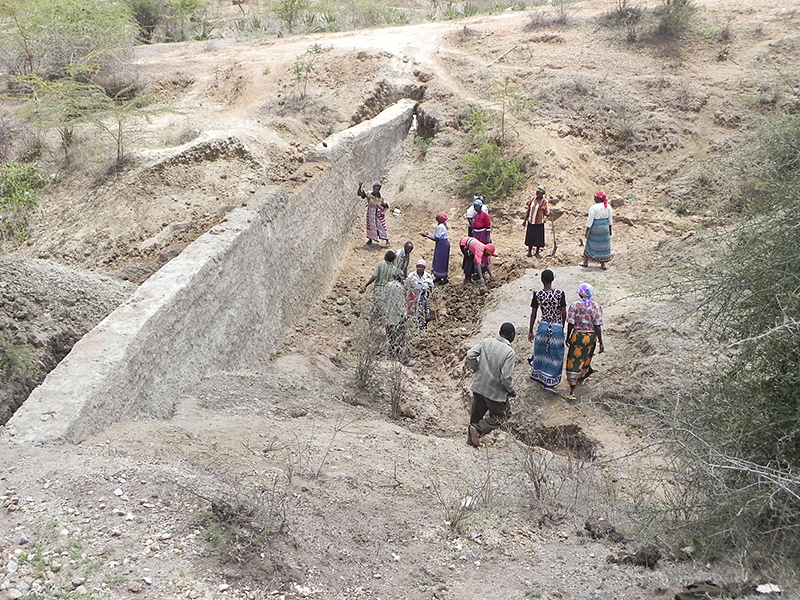
Progress with construction of the Mango dam October 2015.
PCAT has provided grants to farmers through Njarange Area Project to help meet the cost of water pipes to provide irrigation for domestic plots. The result is a significant increase in food production to help meet the family’s basic food needs. In 2014 50 families benefitted from these grants.
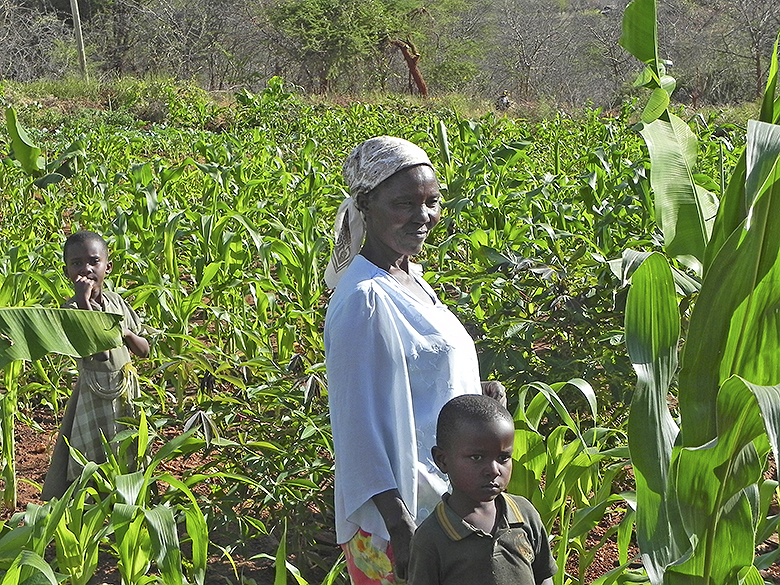
A local farmer who has benefited from a PCAT funded micro-irrigation scheme.
A key element of this funding programme is the provision of water tanks for schools. This enables the school to harvest water during the rainy seasons and reduces the need either for students to spend time collecting water or for the schools to purchase water supplies. An example of this funding is the water tank at Kathigagaceru secondary school. Before the water tank was provided there was no water supply at the school. All water had to be collected by students from a river a kilometre from the school.
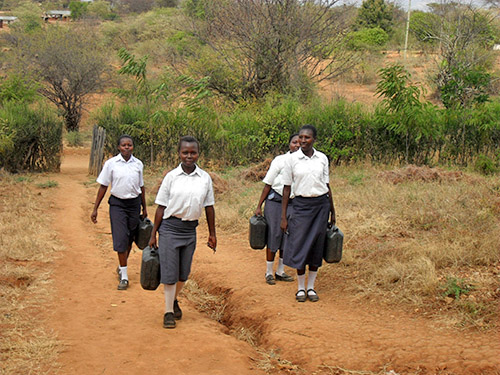
Kathigagaceru secondary school students used to fetch water from the river in plastic jerry cans.
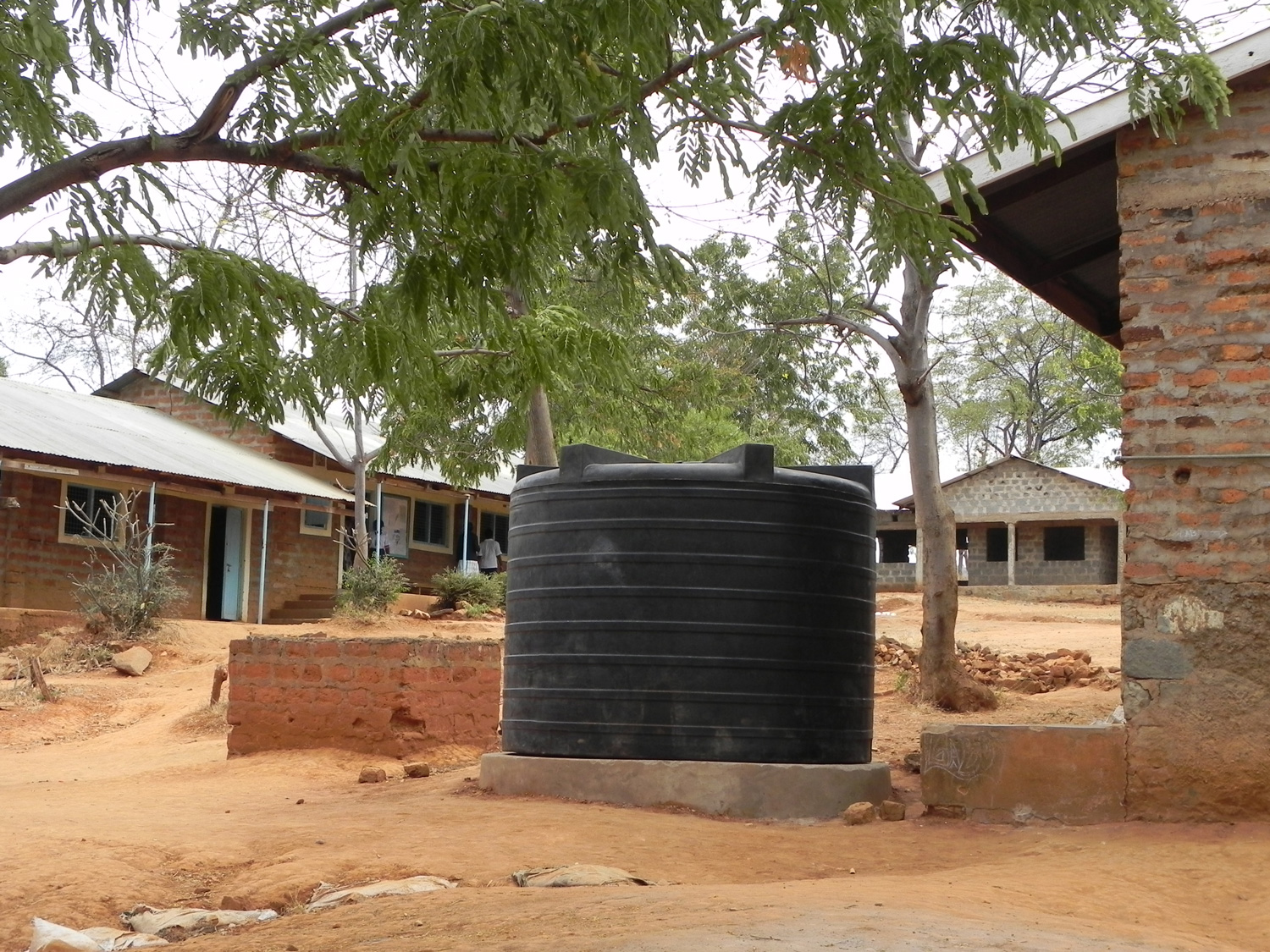
The new water tank at Kathigagaceru secondary school.
In 2017 eleven schools in Mbeere district were provided with water tanks with a further five schools provided with a water tank in 2018. None of these schools have a piped water supply and in many cases did not have a water tank until a grant from PCAT enabled the school to purchase one. The funding programme for 2019 includes a further thirteen water tanks for schools.
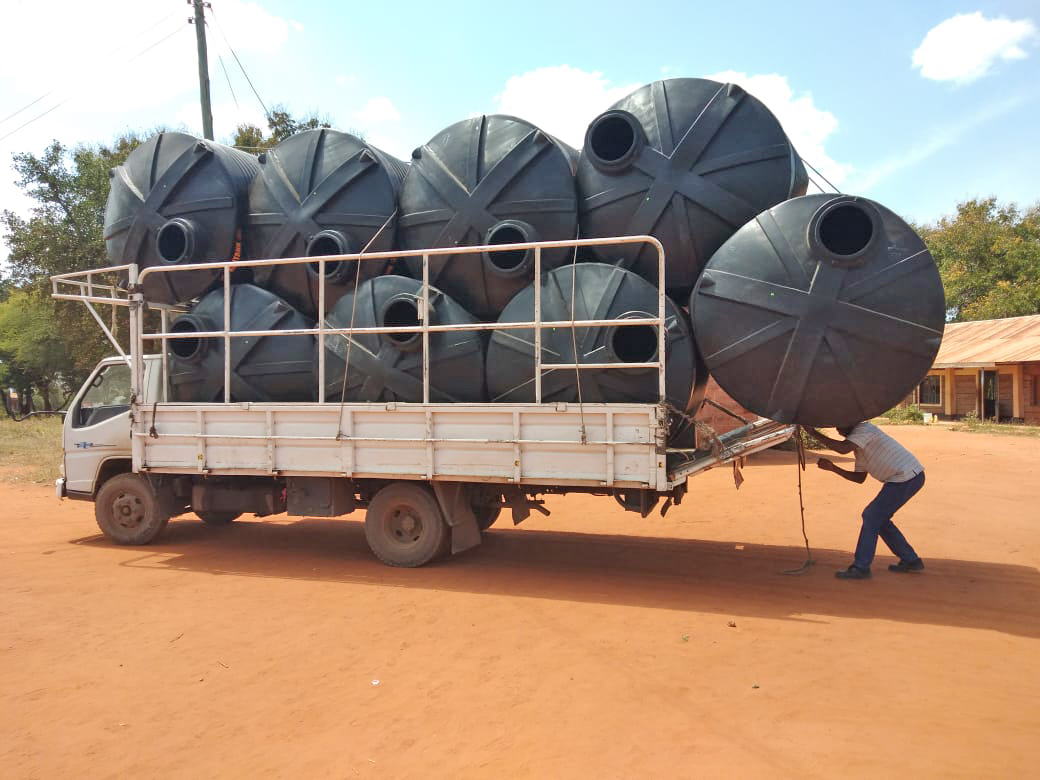
New water tanks ready to be delivered.
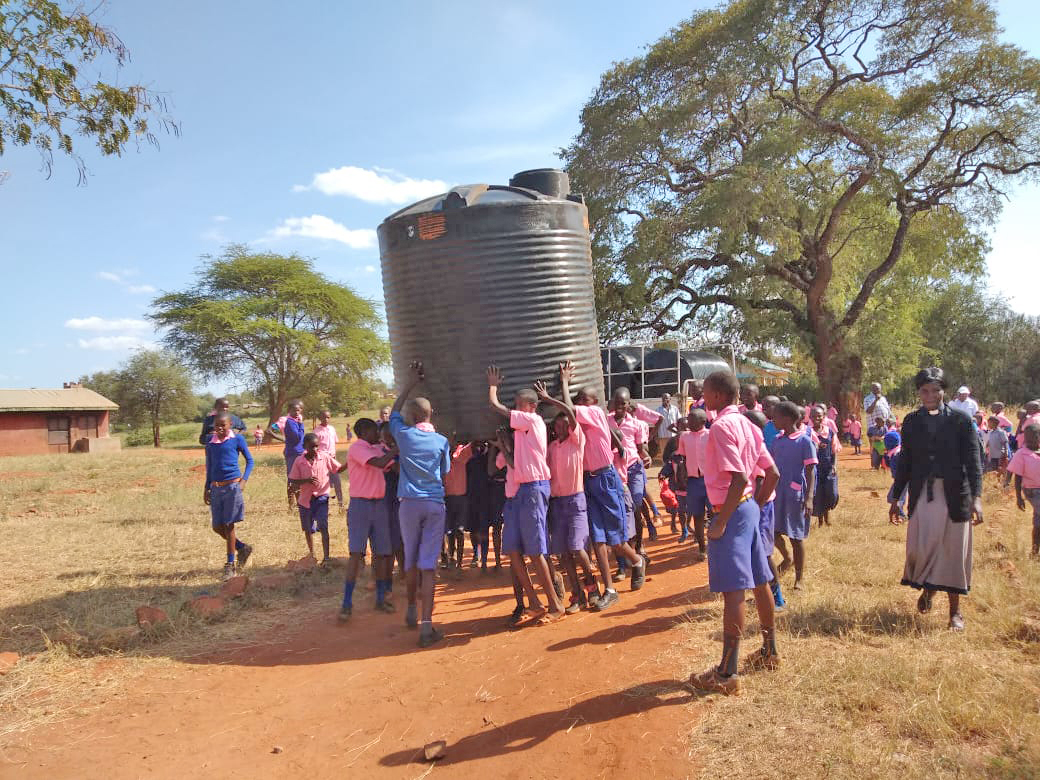
New water tank being delivered to a school in Mbeere.
The provision of boreholes to provide safe water supplies, and small scale dams and water tanks to enable water collection and storage are all ways of helping local communities respond to water shortages.
In the areas where PCAT’s partners work many local communities lack access to safe and reliable sources of drinking water. PCAT has funded the provision of a number of boreholes with handpumps, particularly in the Isiolo area. More recently PCAT has funded the drilling of a borehole for the school and community at Gacabari, a very isolated area of Mbeere district. The borehole is 30 metres deep. A pump and water storage tanks still need to be provided. Although the county government had promised funding for this no funding has yet been provided.

Gacabari borehole and pump at Isiolo.
PCAT has provided funding for two earth dams in Mwala district in Machakos county and three earth dams in Mbeere district in Embu county. The Mwala dam was constructed in 2011/12 and is in a gully to catch water run-off during the rainy seasons and provides a water supply to 40 families living in the immediate area. There is no local piped water supply and no nearby borehole.

The dam at Mathima under construction in 2011.

The completed dam at Mathima in October 2012.
In 2015 PCAT provided a grant for the construction of a second concrete and earth dam proposed by the Mango women’s group. The dam wall is about three metres high and the reservoir will be filled from water run off during the rainy season. The dam benefits 25 families in the locality where the nearest water supply is about 2.5km away.

Construction work for the Mango dam – reinforcing rods for the concrete dam base. The dam catchment area is behind the workmen.
PCAT has provided grants to farmers through Njarange Area Project to help meet the cost of water pipes to provide irrigation for domestic plots. The result is a significant increase in food production to help meet the family’s basic food needs. In 2014 50 families benefitted from these grants.

A local farmer who has benefited from a PCAT funded micro-irrigation scheme.
A key element of this funding programme is the provision of water tanks for schools. This enables the school to harvest water during the rainy seasons and reduces the need either for students to spend time collecting water or for the schools to purchase water supplies. An example of this funding is the water tank at Kathigagaceru secondary school. Before the water tank was provided there was no water supply at the school. All water had to be collected by students from a river a kilometre from the school.

Kathigagaceru secondary school students used to fetch water from the river in plastic jerry cans.

The new water tank at Kathigagaceru secondary school.
In 2017 eleven schools in Mbeere district were provided with water tanks with a further five schools provided with a water tank in 2018. None of these schools have a piped water supply and in many cases did not have a water tank until a grant from PCAT enabled the school to purchase one. The funding programme for 2019 includes a further thirteen water tanks for schools.

New water tanks ready to be delivered.

New water tank being delivered to a school in Mbeere.
 PETER COWLEY AFRICA TRUST IS A REGISTERED CHARITY NO: 1037257
PETER COWLEY AFRICA TRUST IS A REGISTERED CHARITY NO: 1037257